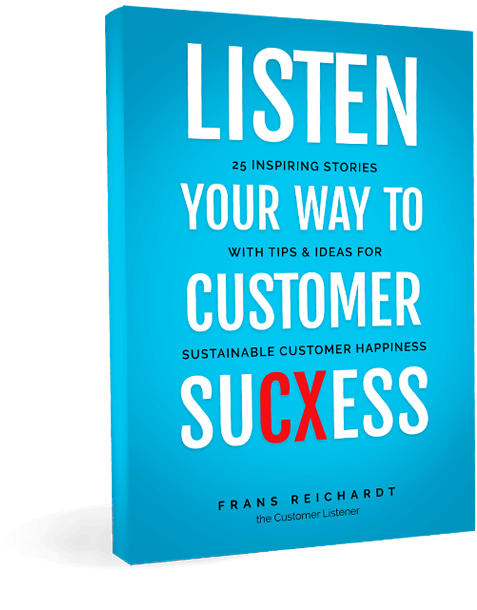Boost Your Career With Better Listening Skills
Empathy, silence, body language, and effort all come into play
Published on FMMagazine.com on 19 April 2019
 Frans Reichardt learned the art of emotional listening from his mother. When Reichardt was a boy in the Netherlands, he regularly observed her asking his father about work over the dinner table. “You ask questions, but you don’t know what he’s talking about — or do you?” he recalled asking his mom when he was a teen. Her reply was enlightening: She wasn’t all that interested in what her husband was doing but rather how he was doing.
Frans Reichardt learned the art of emotional listening from his mother. When Reichardt was a boy in the Netherlands, he regularly observed her asking his father about work over the dinner table. “You ask questions, but you don’t know what he’s talking about — or do you?” he recalled asking his mom when he was a teen. Her reply was enlightening: She wasn’t all that interested in what her husband was doing but rather how he was doing.
That experience made such an impact on Reichardt that he became a professional speaker and coach, known as The Customer Listener, advising companies on how to attract, retain, and listento customers. “People want to be listened to and want to be seen,” he said.
What he learned early on is this: Listening matters. It matters in marriages and in friendships, and it is a crucial skill in business. Those who listen well — and strive to do so — exude sympathy for another person’s angst; they can motivate employees to be focused, once they recognise their fears; and they form unshakeable bonds, personally or professionally, by being interested and concerned.
“Attention and empathy go hand in glove,” said Rick Bommelje, book author, communications professor at Rollins College, and president of the Leadership & Listening Institute Inc., based in Orlando, Florida. “We’re dealing with people, and people have feelings, and feelings are important.”
Many professionals, though, are lousy listeners. “Somewhere we lost the habit of speaking and listening and we need to rediscover this,” quipped Julian Treasure, a communications specialist, book author, and founder of The Sound Agency, a UK-based audio-branding company. In his TED talk, “5 Ways to Listen Better”, which has almost 7 million views, he noted that people spend about 60% of their communication time listening to others, but retain only 25% of what they hear.
Why is good listening so difficult? There are too many distractions, particularly in this screen-based age of email, mobile phones, and other devices. Most people also make assumptions and generalise about others, traits which impact how they listen, Treasure said. Even professionals can struggle with listening because of emotions or distracting thoughts; it is also common to think about what one will say while pretending to listen, according to Treasure.
He stresses that it takes time, concentration, and an appropriate environment to have an effective conversation. Case in point: It may be impossible to have a successful business dialogue in a noisy coffee shop while one is intermittently checking one’s text messages. In that example of everyday chaos, one may hear, but not listen well.
Treasure, Reichardt, and Bommelje, three listening experts, offer the following tips on how to be a more empathetic and intelligent listener:
Be conscious.
Hearing is involuntary, but listening is a skill that can be perfected. So before you can listen well, you must be conscious that you are doing it. “Be aware that listening is a choice,” said Reichardt. “Most people can hear, but hearing doesn’t mean you are listening.” So make a conscious effort to truly take note. And stay open to everything the other person is saying. Don’t judge.
Be aware of body language.
Stay focused, and maintain eye contact. Face others, and if sitting, lean forward to express interest. “Body language is extremely important,” Treasure said. Also, noted Reichardt, “Observe the other person’s body language, gestures, and facial expressions. The body tells you more than just the words.”
Be compassionate and curious.
Exhibit kindness, well wishing, and empathy. “Most people don’t listen in an empathetic way, because they listen automatically,” Reichardt said. “Good, effective listening is more giving.” Make an effort to understand the other person and to discover what drives them. Give them the floor and ask open-ended questions. “An honest, open question has no agenda, and one of the primary reasons to ask it is to enable the other person to hear their own voice,” Bommelje added.
Embrace quietness.
Most of us are uncomfortable when there’s a break in dialogue, but silence can be beneficial. “It’s a big mistake to think you have to fill every second of the conversation with your voice,” Treasure said. “Silence in conversations can be powerful, and pauses give the other person a chance to respond.” Also, said Reichardt, “Create a safe, quiet, and inviting environment” to minimise distractions and make you a better listener.
Don’t interrupt.
People often feel compelled to interject their own brilliant thoughts, even when another person is still conversing. But that’s not productive, Treasure said. Take a deep breath prior to speaking; this will give you “a split second when you might realise the person is still talking”, he added. Make the conversation about them, not you. Listen.
Take action.
Once you are mindful about listening, identify a behaviour or an action to help make you a better listener, such as “keeping your phone in your pocket on purpose, rather than having it out on a table in a meeting room”, Bommelje said. “The repeated action over a period of time will create a habit. Listening pays in many ways if you make the investment.”
— Cheryl Meyer is a freelance writer based in the US.








Leave a Reply
Want to join the discussion?Feel free to contribute!